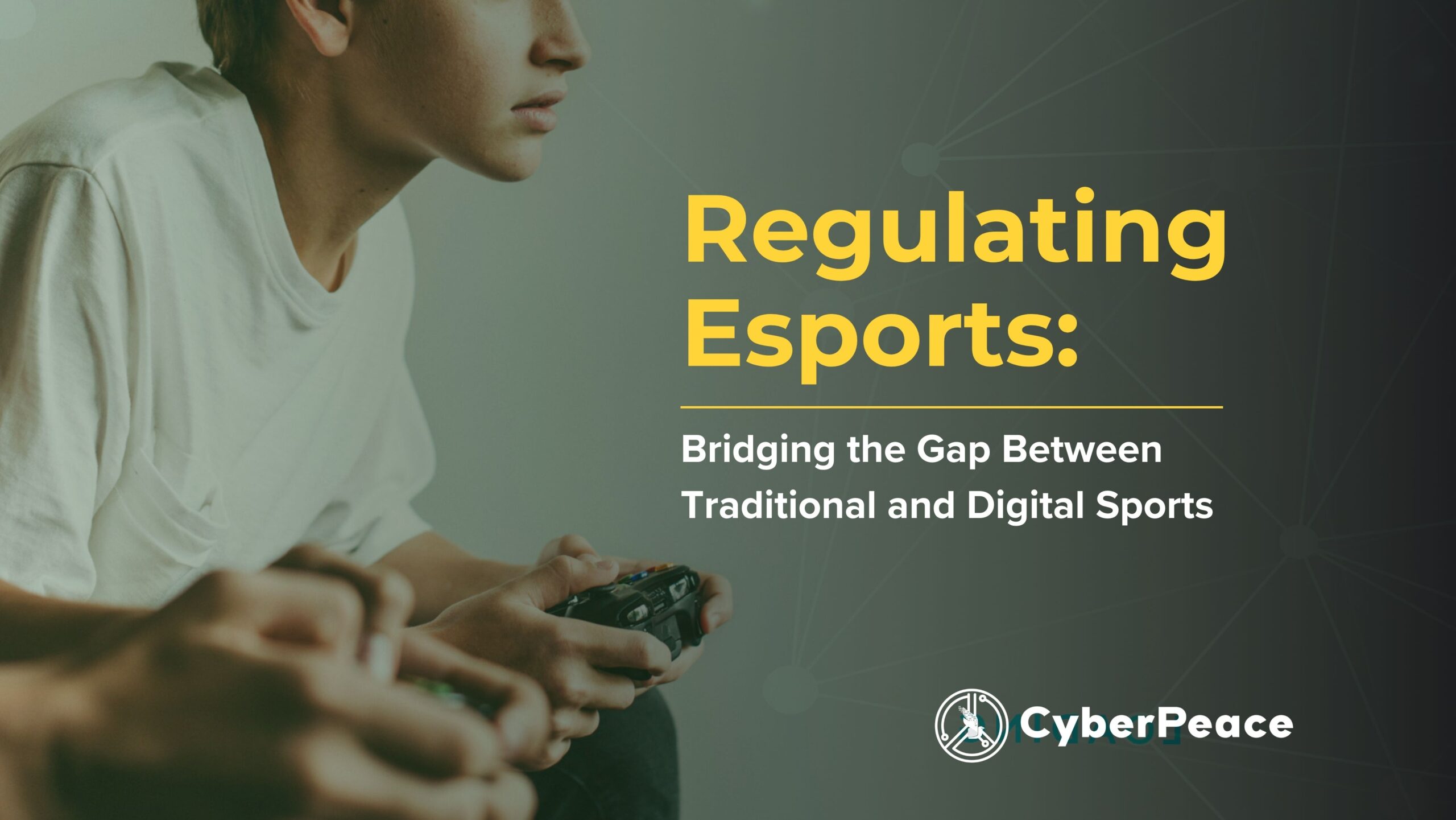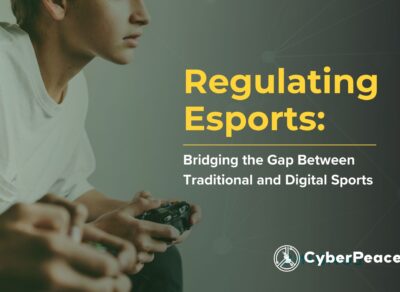
Regulating Esports: Bridging the Gap Between Traditional and Digital Sports
Introduction
The development of high-speed broadband internet in the 90s triggered a growth in online gaming, particularly in East Asian countries like South Korea and China. This culminated in a massive spike in the competitive gaming market, which otherwise existed in the form of high-score and face-to-face competitions. By 2024, the online competitive gaming market has only become bigger, with a separate domain for professional competition, called esports. This industry is projected to reach US$4.3 billion by 2029, driven by advancements in gaming technology, increased viewership, multi-million dollar tournaments, professional leagues, sponsorships, and advertising revenues. However, the industry is still in its infancy and can draw lessons in regulation
from the traditional sports market to ensure the fairness and integrity vital for uniform global growth.
The Growth and Appeal of Esports
The appeal of esports lies in its accessibility, design innovations, and facilitation of social connectivity for players and fans alike. The industry comprises individuals or teams of athletes who may be recruited by organizers to compete in leagues for huge reward prizes. For scale, the 2024 ESports World Cup (EWS) held in Saudi Arabia had the largest combined prize pool of over US$60 million. Such tournaments can be viewed in arenas and streamed online and by 2025, around 322.7 million people are forecast to be occasional viewers of esports events. According to Statista, esports revenue is expected to demonstrate an annual growth rate (CAGR 2024-2029) of 6.59%, which will result in a projected market volume of US$5.9 billion by 2029. Owing to its massive popularity, esports first debuted as a medal sport in the Asian Games of 2022. In 2024, the International Olympic Committee (IOC) announced the Olympics ESports Games, with the inaugural event set to take place in 2025 in Saudi Arabia. Hosting esports events such as the EWS is expected to boost tourism and the local economy of the host country.
The Challenges of Esports Regulation
While the esports ecosystem provides numerous opportunities for growth and partnerships, its under-regulation presents challenges. Due to the lack of a single governing body akin to the IOC for the Olympics and FIFA for football to lay down centralized rules, the industry faces certain issues such as :
a. Integrity Issues: Esports are not immune to cheating attempts. Match-fixing, using advanced software hacks, doping (e.g., Adderall use), and the use of other illegal aids are common. DOTA, Counter-Strike, and Overwatch tournaments are particularly susceptible to cheating scandals. Tournaments may roll out bans and disqualifications, but this doesn’t address the ethics of cheating or unified enforcement of pre-existing codes.
b. Athletes’ Rights: The teams that contractually own professional players provide remuneration and exercise significant control over athletes, who face issues like overwork, a short-lived career, stress and other health concerns, the absence of collective bargaining forums, instability, etc.
c. Fragmented Regulatory Environment: While multiple countries have recognized esports as a sport, policies on esports governance and regulation vary within and across countries depending on existing frameworks and the market. For example, gambling and advertising laws differ by country, which
impacts the profitability and thus, growth of the ecosystem.
d. Cybersecurity Concerns: The esports industry carries substantial prize pools and has growing viewer engagement, which makes it increasingly vulnerable to Distributed Denial of Service (DDoS) attacks, malware, ransomware, data breaches, phishing, account hijacking, and more. Tournament organizers must
prioritize investments in secure network infrastructure, perform regular security audits, encrypt sensitive data, implement network monitoring, utilize API
penetration testing tools, deploy intrusion detection systems, and establish comprehensive incident response and mitigation plans.
Proposals for Esports Regulation: Lessons from Traditional Sports
Based on the governance and regulatory frameworks of traditional sports, some urgent interventions can be drawn as follows:
a. Need for a Centralized Esports Governing Body: Unlike traditional sports, the esports landscape lacks a Global Sports Organization (GSO) to oversee its
governance. Instead, it is handled de facto by game publishers with industry interests different from a traditional GSO. Publishers’ primary source of revenue is not esports, which means they can adopt policies unsuitable for its growth but good for their core business. Appointing a centralized governing body with the power to balance the interests of multiple stakeholders and manage issues like unregulated gambling, athlete health, and integrity challenges is a logical next step for this industry.
b. Gambling/Betting Regulations: Traditional GSOs release a code of conduct with regulations regarding gambling, betting, and match-fixing activities, which are subject to the laws of each country. Similar rules in esports are managed primarily at an individual level by publishers/ tournament organizers, leading to inconsistencies and legal grey areas. The esports ecosystem needs standardized regulation to preserve fair play codes and competitive integrity.
c. Anti-Doping Policies: With the rising monetary stakes in esports, there is increasing adderall abuse among young athletes to enhance performance. The
industry must establish a global framework similar to the World Anti-Doping Code, which in conjunction with eight international standards harmonizes anti-
doping policies to ensure the same standards for all athletes. Esports policy will have to devise strategies to curb stimulant abuse.
d. Norms for Participant Health: Professional players start around age 16 or 17, and tend to retire around age 24. They may be subjected to rigorous practice hours and stringent contracts by the teams that own them. There is a need for an international norm setting by a federation overseeing the protection of underage players. Enforcement of these norms can be one of the responsibilities of a decentralized system comprising country and state-level bodies. This also ensures fair play governance.
e. Respect and Diversity: While esports is technologically accessible, it still has room for better representation of diverse gender identities, age groups, abilities, races, ethnicities, religions, and sexual orientations. Embracing greater diversity and inclusivity would benefit the industry’s growth, and enhance its potential to foster social connectivity through healthy competition. Conclusion The development of the world’s first esports island in Abu Dhabi gives impetus to this rapidly growing industry with millions of fans across the world. Stakeholders of esports must collaborate to create a robust framework that benefits players, fans, and the industry at large. By drawing lessons from traditional sports, esports can establish robust governance structures, safeguard athlete rights, and foster a more secure and equitable ecosystem. A centralized governing body, standardized anti-doping measures, inclusive policies, and frameworks to protect young players and diverse communities are essential steps towards its sustainable growth. Embracing regulation and inclusivity will not only give esports credibility, but also make it a powerful platform for unity, creativity, and social connection in the digital age.
Resources
● https://www.statista.com/outlook/amo/esports/worldwide
● https://www.statista.com/statistics/490480/global-esports-audience-size-viewer-type/
● https://asoworld.com/blog/global-esports-market-report-2024/#:~:text=A%20key%20driver%20of%20this%20growth%20is%20the%20Sponsorship%20%26%20Advertising,US%24288.9%20million%20in%202024.
● https://lawschoolpolicyreview.com/2023/12/28/a-case-for-recognising-professional-esports-players-as-employees-of-their-game-publisher/
● https://levelblue.com/blogs/security-essentials/the-hidden-risks-of-esports-cybersecurity-on-the-virtual-battlefield
● https://medium.com/@heyimJoost/esports-governance-and-its-failures-9ac7b3ec37ea
●https://www.google.com/search?q=adderall+abuse+in+esports&oq=adderall+abuse+in+esports&gs_lcrp=EgZjaHJvbWUyBggAEEUYOTIHCAEQIRiPAjIHCAIQIRiPAtIBCDU2MDdqMGo5qAIAsAIB&sourceid=chrome&ie=UTF-8
● https://americanaddictioncenters.org/blog/esports-adderall-abuse#:~:text=A%202020%20piece%20by%20the,it%20because%20everyone%20was%20using.





FEEL FREE TO DROP US A LINE.